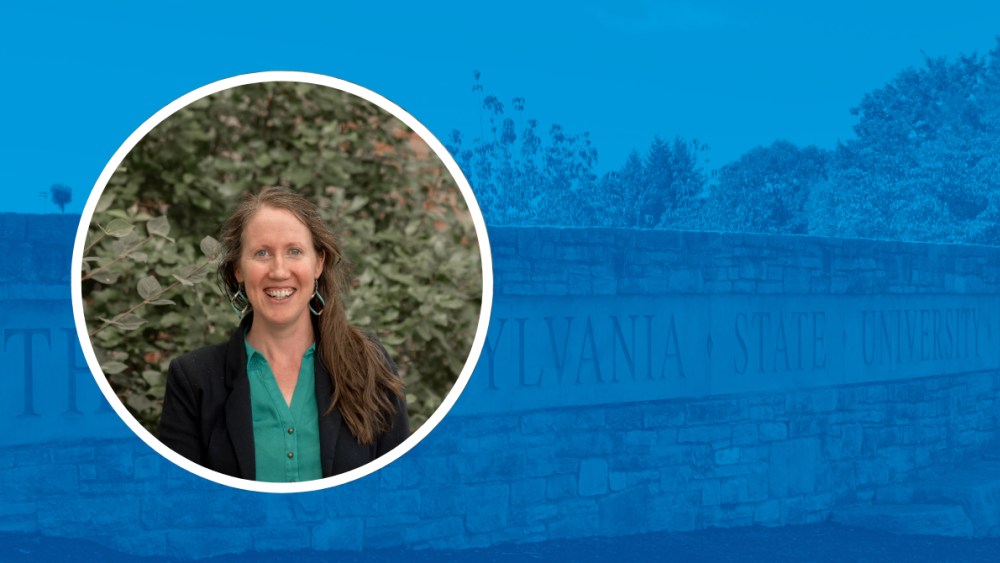
Michelle Sikes Credit: Penn State. Creative Commons
June 13, 2025
By Brooke Pier
UNIVERSITY PARK, Pa. — Previously a Rhodes Scholar herself, Penn State Department of Kinesiology’s Michelle Sikes, associate professor of kinesiology and of African studies, now uses her experience to mentor Penn State’s finalists for the Rhodes Scholarship.
This competitive, merit-based scholarship fully funds senior undergraduate students to continue their education full-time at the University of Oxford for two or more years in almost any field offered by the university. The first round of the selection process evaluates students based on their personal and academic statements that detail their accomplishments and interests. Once finalists are identified, they participate in a social engagement event and final panel interview that determines who becomes a scholar.
Since fall 2023, Sikes, who is also an affiliate professor of history and associated with the Rock Ethics Institute, has served on a mentoring committee to help Penn State’s finalists for the Rhodes Scholarship prepare for the final panel interview.
Formed by the Office of Undergraduate Research and Fellowship Mentoring, the committee consists of senior administrators and faculty members from across the University, some of which are previous Rhodes Scholars, like Sikes. They use their collective experience and expertise to coach students through mock interviews that mimic the scholarship program’s final interview, which will determine who receives the award for that cycle.
“Our goal is to prepare these finalists to not only explain their academic interests and successes well, but to also go into the interview confidently and showcase their personality,” Sikes said. “The panel is interested in more than just your qualifications on paper, they want to see your inner spark that you bring to the area or topic that the scholarship will fund.”
After finalists are selected, they have around two weeks to practice with the committee to prepare for the final round, the program’s social engagement event and final interview.
The final round takes place over the course of two days and consists of a social hour where finalists mingle and connect with each other, along with those individuals serving on the final interview panel. On the day of the final interviews, each student is asked about their academic interests that they would like to pursue at Oxford University.
“When I’m explaining to students what the final interview is like, I try to pass on to them the importance of being themselves as much as possible and to allow who they are to shine through,” Sikes said. “When I interviewed for my scholarship in 2007, I tried to be relaxed and confident rather than overthink the situation. Even though the panel is invested in identifying a single awardee, they’re also deeply invested in the finalists and their aspirations.”
This past fall, Sikes and the committee mentored three Penn State finalists; Anshuta Beeram, comparative literature and pre-medicine; Nate Carey, biotechnology; and Kueyoung Kim, chemistry, all of whom graduated from their respective academic programs in May 2025. These students ultimately did not receive the Rhodes Scholarship, but did go on to be awarded similarly prestigious scholarships from other programs.
Sikes received a Rhodes Scholarship in 2007 when she was an undergraduate student at Wake Forest University, where she earned a degree in mathematical economics. She credited the trajectory of her career to her time at Oxford University as a Rhodes Scholar, as it allowed her freedom to choose a non-traditional career pathway.
“Many of my peers went into economic careers, but the Rhodes Scholarship provided me the opportunity to pursue a master’s in economic and social history,” Sikes said. “I ended up researching the history of women’s distance running in Kenya, which drew from my own interest and experience in the sport and my desire to fill the gap in research of women’s running successes in this population.”
Sikes researched female runners in Kenya, collecting their stories and experiences as Olympic Games and World Championship qualifiers to understand the challenges these women faced and how they became some of the world’s fastest runners.
Ultimately, her dissertation on this research culminated in her published book “Kenya’s Running Women: A History,” which offers a lens into understanding sport and women’s roles in society.
“My dissertation and insights on the Kenyan running women wouldn’t be possible without the Rhodes Scholarship giving me the chance to dive into this topic,” Sikes said. “It also led me here to Penn State, where I found very supportive colleagues in the Department of Kinesiology. I hope my Rhodes Scholar experience can help future potential scholars.”
Sikes said she has enjoyed being part of the mentoring committee for Penn State’s Rhodes Scholarship finalists and looks forward to continuing to help Penn State’s future finalists prepare for that final interview.
“The interview experience for this scholarship is unlike anything else,” Sikes said. “And I’m happy I can take my experience and help students prepare and give their best effort to try and be chosen for this amazing opportunity.”
Brooke Pier
Get the news by email

Recent Comments